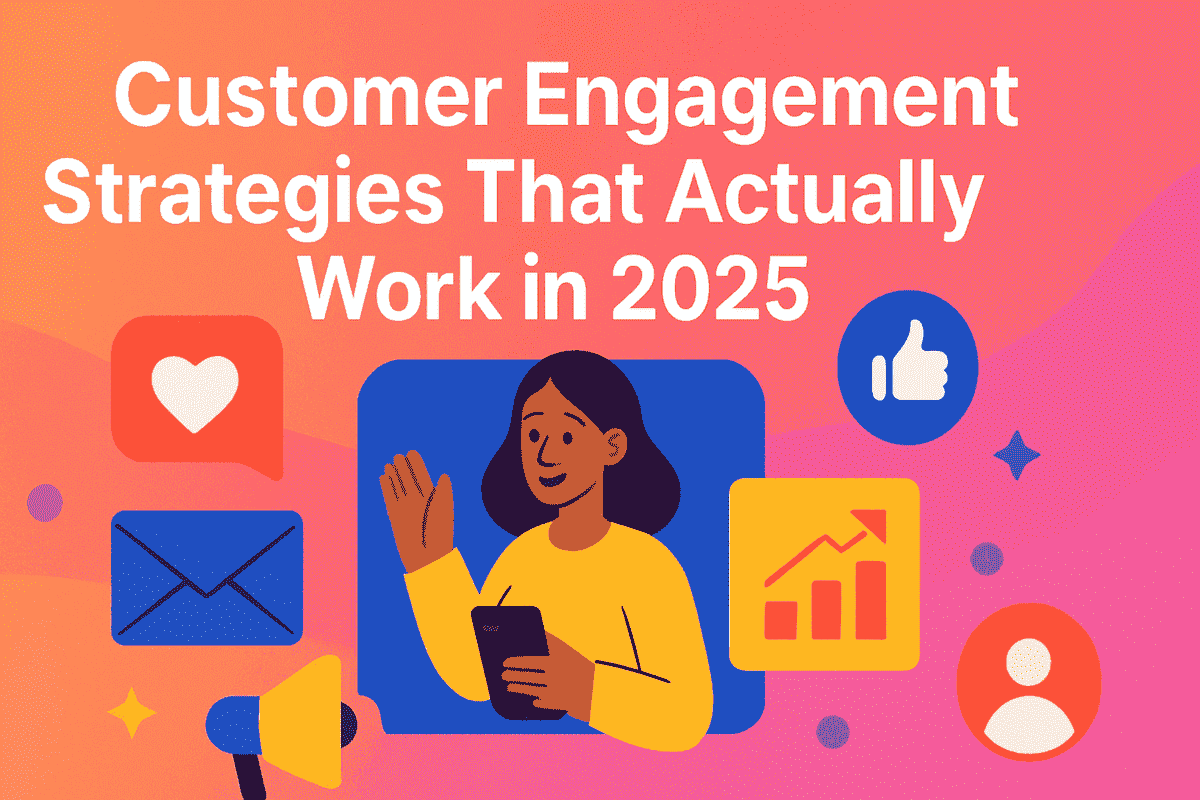"Engage, or become invisible." That's the unofficial principle of business today.
In 2025, customer attention spans are shrinking while their expectations are growing. Gone are the days when sending an occasional email or posting on social media was enough.
If you're not actively engaging your customers with personalized, meaningful experiences, you're leaving revenue on the table — and probably losing customers to competitors who aren't.
This article dissects actual, proven customer engagement strategies specifically for small and medium-sized U.S. companies. If you're a retailer, SaaS provider, healthcare organization, or local services company — these strategies are designed to make you connect, convert, and retain like never before.
What Is Customer Engagement in 2025?
Today's customer engagement isn't merely about interactions — it's about relationships. In 2025, the word encompasses the continuous value-driven dialogue between your brand and customers through all touchpoints, such as:
It's being more listener than talker, anticipating needs before they're expressed, and making customers feel like you just get them.
Why SMBs Can't Afford to Ignore It
If you're an SMB in the U.S., here's why engagement needs your undivided attention:
Generated by repeat customers
Engaged customers refer others
- Acquisition is getting more expensive, but retention is less costly
- Engagement fuels reviews, referrals, and word-of-mouth reputation
Disconnecting from engagement is not only a missed opportunity — it's a danger to your growth.
Strategy 1: Hyper-Personalization Through First-Party Data
"Generic" is dead.
First-party data — gathered directly from your customer — is 2025 gold. It encompasses browsing behavior on your site, history of purchase, email opens, and chatbot interactions.
Send product recommendations
Based on browsing history
Personalize email campaigns
Subject lines and promotions
Segment users
Based on behavior or lifecycle stage
Pro Tip: Leverage Klaviyo or HubSpot for fluid behavioral segmentation and automation.
Strategy 2: Conversational Experiences (Chat, SMS, AI)
Customers don't care about filling in forms. They want to converse.
Conversational commerce is taking off in 2025. Leverage AI-driven chatbots, live chat support, and SMS to:
Respond to common questions automatically
Shipping updates and reminders
Process reorders via text
Why it works: It's quick, easy, and makes the user feel personal — particularly for mobile-first shoppers.
Strategy 3: Customer Loyalty Programs That Actually Reward
End rewarding points. Begin rewarding value.
Modern loyalty programs need to transcend punch cards or promo codes. Engage in emotional loyalty with:
VIP Access
Early access to new products and sales
Personalized Gifts
Birthday surprises and milestones
Subscription Perks
Free shipping and exclusive content
Referral Rewards
Surprise incentives for referrals
Tool Recommendation: Experiment with Smile.io or Yotpo Loyalty to handle tiered programs effectively.
Strategy 4: Omnichannel Engagement (Done Right)
Consistency is key to building trust.
You must connect customers where they are — and more so, how they desire. That includes:
Consistent across all channels
Single tone and look
Single CRM for all data
Tip: Put Shopify, Mailchimp, and Meta ads under a single CRM to prevent message fragmentation.
Strategy 5: Emotionally Connecting Content
Don't sell — connect.
Content marketing is one of the most affordable engagement tools. In 2025, emotional storytelling triumphs. Your content must:
Address Pain Points
Solve real customer problems
Behind the Scenes
Show your company culture
Success Stories
Share customer wins
Video Content
More engaging than text
Remember: Your brand is what people feel about you, not what you tell them you are.
Common Mistakes to Avoid
Don't get caught in these engagement traps:
-
Over-automation without personalization
Balance automation with personal touch
-
Generic messaging
Sending the same message to all
-
Ignoring feedback
Suppressing customer feedback or reviews
-
Inconsistent experience
Fluctuating experiences between touchpoints
-
Neglecting existing customers
Focusing on new leads over existing customers
Real-Life Example: A Small Business Turnaround
A San Francisco-based coffee roaster was experiencing decreasing repeat sales in 2024. By adopting:
Order confirmations
Early access program
Monthly personalized
Their repeat purchase rate increased by 38% within 4 months.
Frequently Asked Questions
What is the #1 customer engagement tactic for small businesses in 2025?
Hyper-personalization with customer data is the highest-performing approach.
Is email engagement still effective?
Yes — but only if it's personalized, timely, and segmented.
How do I calculate engagement?
Monitor open rates, repeat buys, reviews, time on site, and customer lifetime value.
What's the optimal tool for small teams?
Begin with budget-friendly platforms such as Brevo, Mailchimp, or Intercom.
Can I automate while not losing the human touch?
Yes — leverage automation to scale personalization, but not replace it.
Conclusion & Next Steps
Customer engagement is no buzzword — it's the key to sustainable growth in 2025. Small and medium-sized businesses who get engagement right will create more meaningful relationships, increase retention, and grow more quickly.
Begin small. Pick one tactic, tailor it to your audience, and grow from there.
What's your next step to connect with your customers?

